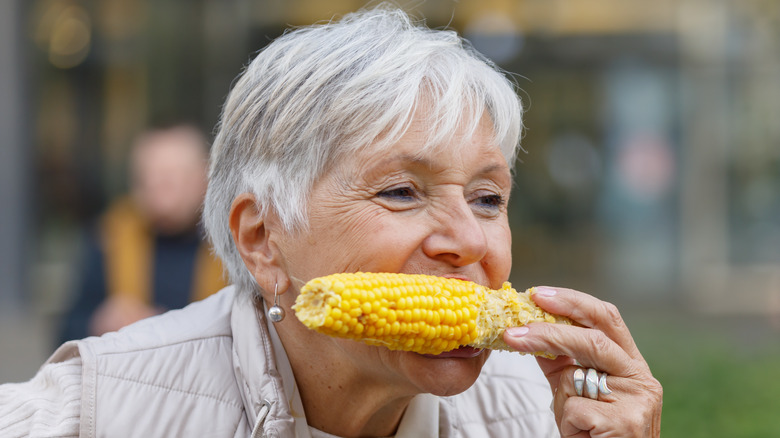Avoid Eating Corn If You Have This Medical Condition
When it comes to health benefits, corn is a gold mine. It is claimed to support the health of our vision, heart, blood sugar levels, and more.
People in the U.S. devour an average of 5.5 pounds of sweet corn annually, reports the Cleveland Clinic. However, creamed corn, cornbread, cornmeal, and any other corn-based foods are best avoided for individuals diagnosed with gastritis.
Although often mixed up with acid reflux or gastroesophageal reflux disease (GERD), gastritis pertains to stomach inflammation rather than esophageal inflammation (per GI Associates & Endoscopy Center). The condition is characterized by indigestion, bloating, fullness in the upper abdomen following a meal, or the reduction of abdominal pain while eating, among other symptoms.
Acute gastritis cases tend to be linked with dietary choices and other outside factors — such as excess NSAID use, smoking, and stress — while chronic cases stem from a bacterial infection.
Potential complications of the condition may include eventual stomach bleeding or the development of ulcers. For this reason, it's important to seek treatment for gastritis, which may involve adhering to the gastritis diet. In addition to sticking to the recommended foods, corn lands on the list of foods to steer clear of.
Corn may aggravate gastritis symptoms
Whether it's corn on the cob, corn syrup, or baby corn, experts at Care Hospitals explain that corn is made up of sugars that can exacerbate symptoms of gastritis. Cellulose is one such chain of sugar molecules that corn is particularly rich in, according to Manhattan Gastroenterology. Unable to be metabolized by the body, undigested corn makes its way through the gut, prompting symptoms of abdominal pain, cramps, and gas along the way.
Along with corn, the gastritis diet also cites acidic fruits, spicy vegetables, and dairy products as foods to stay away from, all of which can aggravate the lining of the stomach. Red meat, nuts, and peanut butter are also advised against since they can work against efforts to manage gastritis symptoms. The same is true for processed foods and sweetened treats like cakes, pastries, chips, and chocolate. Above all else, you'll want to eliminate alcohol from your diet, which may impact the effectiveness of gastritis treatment methods.
Eat these gastritis-friendly foods instead of corn
Corn may be out, but certain specific fruits and veggies are in. As we said, highly acidic fruits and hot and spicy vegetables are best avoided, but Care Hospitals notes that bananas, berries, apples, pumpkins, and leafy greens are a few food items deemed A-OK on the gastritis diet. Fiber-rich whole grains like oats, brown rice, quinoa, and whole wheat pasta are also a safe bet. When it comes to dairy, opt for low-fat options or nonfat yogurt, which may enhance the health of our gut microbiome. Certain protein sources can also promote satiety, such as eggs, beans, and legumes. When we're full, we're less likely to overeat, which might otherwise take symptoms of gastritis from bad to worse. Although alcohol and coffee are advised against, people with gastritis aren't exclusively limited to water. Rather, some specific teas may help alleviate gastritis distress, including peppermint, turmeric, and ginger tea.
Reach out to your doctor if you experience symptoms of gastritis. Approximately 8 out of every 1,000 people in the United States experience acute gastritis, with rates of chronic gastritis standing at about 2 per every 10,000 individuals (per Cleveland Clinic). Knowing these statistics, you're certainly not alone, and your physician can work with you to accurately diagnose and treat the condition.


